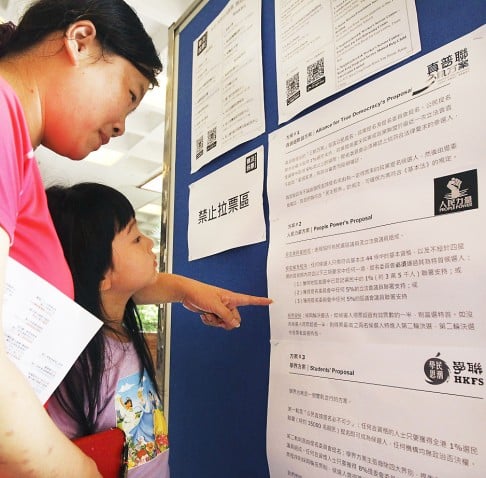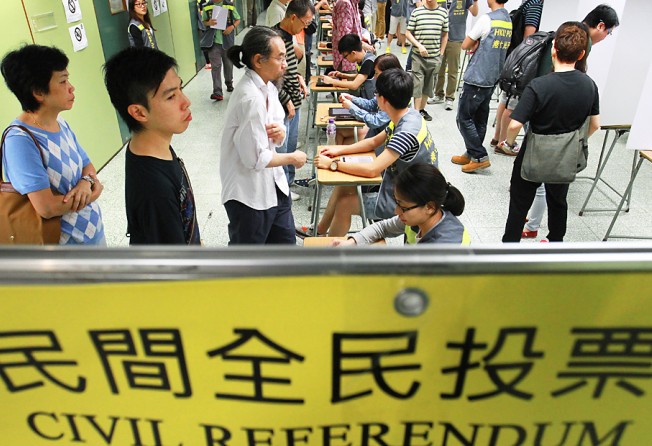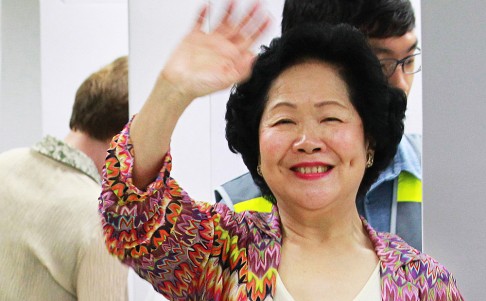
Our voice must be heard, say voters in unofficial Occupy Central referendum
Ninety per cent of people at Occupy Central's polling stations demand a say in who can lead the city, as even critics turn out to vote

Nine out of 10 voters at Occupy Central's polling stations believe the public must have a say in who can run in the next chief executive election, a mini-poll by the South China Morning Post found.
The survey also found that half of respondents say that it was Beijing's contentious white paper on Hong Kong that drove them to the polls. A quarter of them say they will take part in the civil disobedience movement, while half say they are considering it or are unsure.
The survey, held at seven of the 15 polling stations yesterday, had 124 male and 83 female respondents. About 60 per cent have a tertiary education.
The overwhelming backing for "public nomination" - with 87 per cent agreeing that it is a must - comes despite months of propaganda from both local and Beijing officials who disapprove of what they call an "unconstitutional" idea invented by pandemocrats, including the student-led Scholarism.
Businessman Lam Kam-wah, 62, said he had returned from the mainland to vote. He said any electoral system should allow everyone to nominate candidates. "Civic nomination is the only way any universal suffrage can be genuine," he said after voting at Polytechnic University.

They all call for public nomination. But the key difference is in their views on how the nominating committee, required under the Basic Law, should be formed. The students want the committee to comprise only directly elected lawmakers, People Power wants both elected lawmakers and district councillors, and the alliance does not suggest in detail how it can be formed.
The students' proposal won 46 per cent support in the Post's survey. It was followed by the one from the Alliance for True Democracy, which comprises most mainstream political parties, at 36 per cent. People Power's proposal got 6 per cent support.
Alex Wong Cho-him said he voted for the students' proposal because "they have the clearest aim without mixing in political motives".
As for their reasons for taking part in the referendum - participants were asked to give a maximum of two - 85 per cent wanted true universal suffrage without any political screening. Half attributed their action to discontent over the State Council's white paper issued on June 10. The document is seen as narrowing the city's autonomy under the Basic Law.
Thirty per cent said they were unhappy with the current administration, while less than 10 per cent were motivated chiefly by the cyberattacks against Occupy Central last week.
Alex Tsang Chun-kai said it was the white paper that provoked him. "I have seldom taken part in protests, but what drives me this time is really the white paper, which says something like judges should serve the government like a political tool," he said. "Judicial independence can never be compromised."

"I hope this is a message the government will take into account when formulating its proposal for universal suffrage. I particularly hope that Beijing will take note of the turnout."
Despite his earlier criticism that Occupy Central had ousted his moderate proposal through "unrepresentative screening", Civic Party lawmaker Ronny Tong Ka-wah decided to vote after the movement added a second question, asking whether the legislature should veto a proposal that failed to comply with international standards.
"It is a very important question that allows Hongkongers to voice their insights on reform," he said. But he also feared the public's overwhelming call for public nomination would make it even harder to achieve universal suffrage in Hong Kong.
Lee Wai-hung, 50, was among the quarter of interviewees who would take part in Occupy Central's protest. He suffered a stroke nine years ago and is in a wheelchair. "I'm not worried that the protest will be hijacked by violent activists, as long as I stick with the organisers and remain peaceful," he said. "I'm not afraid police will arrest me. I have nothing to lose."
Some voters became emotional. "I'm very touched by the Hongkongers who are willing to stand up every time when the city is at a critical moment. That is the Hong Kong spirit," said a tearful Connie Wong, a human resources manager.
Tony Cheung, Ernest Kao, Jeffie Lam, Stuart Lau, Joyce Ng, Phila Siu, Johnny Tam and Emily Tsang
What the Occupy Central referendum asks voters
(1) For CE Election 2017, I support OCLP to submit this proposal to the Government:
- Alliance for True Democracy Proposal
- People Power Proposal
- Students Proposal
- Abstention
(2) If the government proposal cannot satisfy international standards allowing genuine choices by electors, Legislative Council (Legco) should veto it. My stance is:
- Legco should veto
- Legco should not veto
- Abstention
Watch: Hongkongers voice their opinion on the referendum, democracy, and Occupy Central